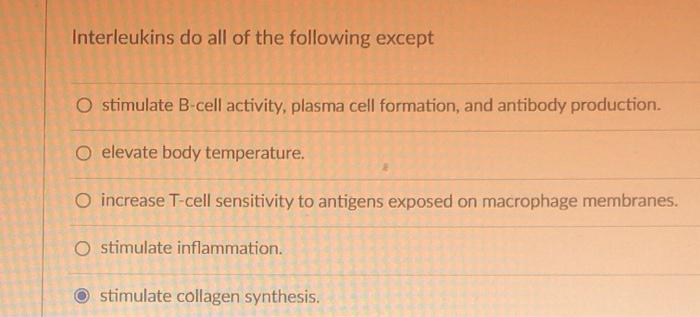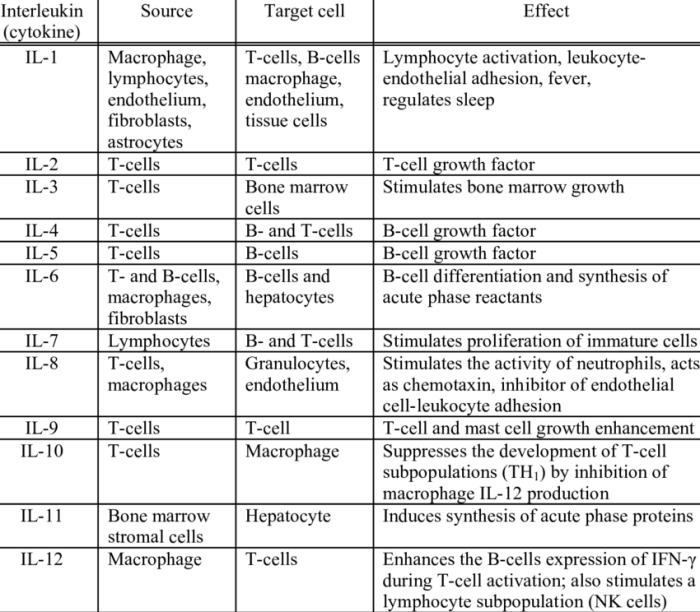Interleukins do all of the following except: a question that delves into the diverse world of interleukins, unraveling their multifaceted roles in orchestrating immune responses while exploring the exceptions that challenge our understanding of these enigmatic molecules.
These signaling proteins, known as interleukins, are crucial players in the intricate network of immune communication, influencing the activation, differentiation, and fate of immune cells. Their involvement in both innate and adaptive immunity underscores their significance in fending off infections and maintaining immune homeostasis.
Overview of Interleukins

Interleukins are a group of cytokines that play a crucial role in the immune system. They are small proteins that act as messengers between immune cells, coordinating their responses to infections and other challenges.
Interleukins are produced by various immune cells, including T cells, B cells, and macrophages. They regulate immune cell activation, differentiation, proliferation, and apoptosis. There are numerous types of interleukins, each with specific functions in the immune system.
Types of Interleukins
- Interleukin-1 (IL-1): Involved in inflammation and immune responses
- Interleukin-2 (IL-2): Essential for T cell activation and proliferation
- Interleukin-4 (IL-4): Promotes antibody production and differentiation of helper T cells
- Interleukin-6 (IL-6): Regulates immune responses and inflammation
- Interleukin-10 (IL-10): Suppresses immune responses and promotes tolerance
Interleukins’ Effects on Immune Cells

Interleukins exert their effects on immune cells by binding to specific receptors on their surface. Upon binding, they trigger intracellular signaling cascades that lead to changes in gene expression and cellular responses.
Activation and Regulation of Immune Cells
- Interleukins can activate immune cells, such as T cells and macrophages, by inducing their proliferation and differentiation into effector cells.
- They can also regulate the activity of immune cells by promoting or suppressing their cytokine production, phagocytic activity, and other functions.
- Interleukins play a critical role in maintaining immune homeostasis by regulating the balance between immune activation and suppression.
- Interleukins, such as IL-1 and IL-6, are released by macrophages and other cells during inflammation.
- They promote the recruitment of neutrophils and other immune cells to the site of infection.
- They also activate natural killer (NK) cells and enhance their cytotoxic activity.
- Interleukins, such as IL-2 and IL-4, are essential for the activation and differentiation of T cells and B cells.
- They promote the formation of memory cells, which provide long-term immunity.
- Interleukins also regulate the production of antibodies by B cells.
- In autoimmune diseases, such as rheumatoid arthritis and lupus, interleukins can promote the activation of autoreactive T cells and B cells.
- This leads to the production of antibodies that attack the body’s own tissues.
- Interleukins, such as IL-4 and IL-13, are involved in the development of allergies.
- They promote the production of IgE antibodies, which bind to allergens and trigger the release of histamine and other inflammatory mediators.
- Interleukins, such as IL-1 and IL-6, are key mediators of inflammation.
- They promote the recruitment of immune cells to the site of inflammation and enhance the production of inflammatory cytokines.
- Anti-interleukin antibodies are used to block the activity of specific interleukins, such as IL-1 and IL-6, in inflammatory diseases.
- Interleukin-based therapies, such as IL-2 therapy, are used to stimulate immune responses in cancer and other conditions.
- Interleukins are also being investigated as potential treatments for autoimmune diseases and allergies.
Interleukins in Immune Responses

Interleukins are involved in both innate and adaptive immune responses. They contribute to the recruitment and activation of immune cells, antigen presentation, and antibody production.
Innate Immune Responses
Adaptive Immune Responses
Interleukins and Disease: Interleukins Do All Of The Following Except
Dysregulation of interleukins can lead to the development of various diseases, including autoimmune diseases, allergies, and inflammatory disorders.
Autoimmune Diseases, Interleukins do all of the following except
Allergies
Inflammatory Disorders
Interleukins in Therapeutics

Interleukins are potential therapeutic targets for immune-related diseases. By modulating the activity of specific interleukins, it is possible to suppress or enhance immune responses.
Current and Emerging Therapies
Answers to Common Questions
What are interleukins?
Interleukins are signaling proteins that play a crucial role in regulating immune responses.
What is the function of interleukins?
Interleukins regulate the activation, differentiation, and fate of immune cells, influencing both innate and adaptive immunity.
What are the exceptions to the functions of interleukins?
Interleukins do not directly kill pathogens or participate in phagocytosis.